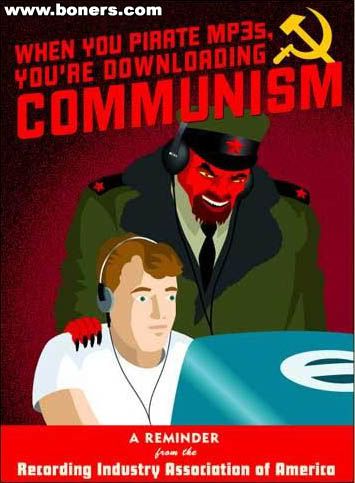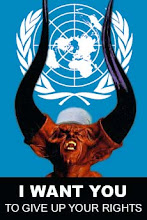Border Security to Become Copyright Police?
A proposed trade agreement could authorize border agents to search the contents of laptops and iPods for copyrighted material
As if the security in airports and controls at border crossings weren't slow and intrusive enough, governments around the world are quietly passing laws to allow them to search the contents of your laptop and other electronic devices, like iPods and cellphones. A United States court last month gave border agents carte blanche to hold a laptop for days and even copy its entire contents. The UK government has given its agents authority to search computers at its borders for pornography. But in what may be the most baffling and cumbersome move of all, the US, Canada, UK, and other EU nations are working behind closed doors on a new trade agreement which could turn border agents into the copyright police.
[ Read Full Story ]Wow, this is some sad, shocking, and vile news. Recent leaked information points the Canadian Conservative Government a participating member in international talks (aka G8 neocon agenda meetings) to develop a new international anti-piracy agreement under the guise of an anti-counterfeiting shroud. The Anti-Counterfeiting Trade Agreement would see Canada join the U.S. and the European Union in a coalition against copyright infringement. The leaked anti-counterfeiting strategy purportedly originated from the U.S. government. The talks, taken behind closed doors so that regular people don’t get to know about until it’s too late, will grant almost unlimited powers for the police and government to monitor any and all activities of Canadian file-sharers.
The legislation will encourage ISPs to monitor the online activities of their customers, and report any and all activity that may infringe copyright law. The agreement covers the copying of information or ideas in a wide variety of contexts. For example page three, paragraph one is a “Pirate Bay killer” clause designed to criminalize the non-profit facilitation of unauthorized information exchange on the internet. Border guards and other public security personnel could become copyright police under the deal. They would be charged with checking laptops, iPods and even cellphones for content that “infringes” on copyright laws, such as ripped CDs and movies. The guards would determine what infringes copyright. The agreement says any copied content would be open for scrutiny — even if it was copied legally. This new agreement goes way beyond the bound of reasonable, it’s Orwellian, unethical, police-state and Nazi-ideologist. I will do everything in my power to educate the public about this horrible modern atrocity that could come to realization if we do not take a stand immediately. This effects everyone, not just Canadians, this agreement is international covering Japan, Switzerland and the European Commision. Sources 1, 2, 3, 4.
31 May 2008
The same Air Force unit at Minot Air Force Base in North Dakota that was responsible for mishandling six nuclear cruise missiles last August failed key parts of a nuclear safety inspection this past weekend, according to a Defense Department report. The 5th Bomb Wing was given an "unacceptable" grade in security of nuclear weapons, according to the review by the Defense Threat Reduction Agency. In another category, management and administration, it received a grade of "marginal..." Those are two areas where failures last summer allowed a B-52 at Minot to be loaded with six air-launched cruise missiles and flown to Barksdale Air Force Base in Louisiana without the pilots, air or ground crews knowing they contained nuclear warheads.
Chertoff: Low threat of WMD terror attack
--Homeland security chief reacts to militant Web chatter about nukes
31 May 2008
Homeland Security Secretary Michael Chertoff downplayed the threat of a nuclear terror attack Friday despite recent postings on al-Qaida-affiliated Web sites exhorting militants to pursue weapons of mass destruction for use against the U.S.
Comcast Is Hiring an Internet Snoop for the Feds
By Noah Shachtman 30 May 2008
Wanna tap e-mail, voice and Web traffic for the government? Comcast, the country's second-largest Internet provider, is looking for an engineer to handle "reconnaissance" and "analysis" of "subscriber intelligence" for the company's "National Security Operations." Day-to-day tasks, the company says in an online job listing, will include "deploy[ing], installing] and remov[ing] strategic and tactical data intercept equipment on a nationwide basis to meet Comcast and Government lawful intercept needs." The person in this "intercept engineering" position will help collect and process traffic on the company's "CDV [Comcast Digital Voice], HSI [High Speed Internet] and Video" services.
America's heartland is about to be gutted: Multinational corporate takeover of North America By chycho 28 May 2008
In video, the senior-most woman in Congress in her thirteenth term in the US House of Representatives, Congresswoman Marcy Kaptur, who represents Northern Ohio's Ninth Congressional District, talks about the North American Union which is a project to integrated Canada, United States and Mexico under one centralized government. For more than 13 years North America’s SuperCorridor Coalition (NASCO) and its members have been working diligently towards creating a superhighway connecting Canada, the United States and Mexico. However, the leaders of these countries continue to deny that such a project even exists.
Internet Police state
Leaked documents are one of the banes of modern western politics. They reveal exercises and actions being proposed that are generally objectionable to the public. Such a leak occurred with the Anti-Counterfeiting Trade Agreement (ACTA) which seeks to turn the internet into a virtual police state. The following report, by Ben Jones, was posted on TorrentFreak.
Again, it's one of the few bastions of anti-corruption, Wikileaks, that has spilled the beans on this unsavory topic. On May 23, the site revealed a document proposing a treaty that will significantly limit the privacy and rights of Internet users, to the benefit of multimillion dollar companies.
Click here for the full article.
"ACTA" is basically an attempt to criminalize the Internet, thus allowing a virtual police state to occur by the selective prosecuting of crimes. In short, it's an international treaty, or hopes to be, that will greatly increase already draconian copyright measures, in a poor attempt to appease the copyright and patent industries.
The proposal is based on the assumption that 'intellectual property rights' (a term used nine times on the first page of the proposal, and 24 times over the entire three-and-a- half page document) trump personal privacy, data protection, probable cause, and lots of other important principles in western democracies.
The measure which has received wider publicity is the so-called 'Pirate Bay killer'. At the end of page two, there is a list of things that should be included in a signee's legal framework, and in the section about criminal sanctions it states "significant willful infringements without motivation for financial gain to such an extent as to prejudicially affect the copyright holder (e.g., Internet piracy)". Think non-profit, personal use file-sharing.
Of course, this could go two ways, as the MPAA, for instance, has been guilty of 'Internet piracy' in the past, with its university toolkit.
The other area most affected by this would be whistle-blower sites like Wikileaks. The owner of any leaked document can claim copyright infringement on its publication, and have it pulled. In this, ACTA is a very effective censorship tool. |
Worst of all though, are the following two points speaking of "establishment and imposition of deterrent-level penalties" and "ex-officio authority to take action against infringers". It is argued that the current level of penalties aren't harsh enough ("people are still doing it, so they're no deterrent"), so there should be room for harsher punishments. Combine this with the ability to prosecute without a rights holder complaint, which means that people could be liable for millions, or imprisoned (they are talking about CRIMINAL enforcement) for sharing Steal this Film, or Paulo Coelho's books. So, these people who actively want you to share would have no say in any such prosecution.
There are some other pure gems proposed, such as "ex officio authority for customs authorities to suspend import, export and trans-shipment of suspected IPR infringing goods". Given that copyright law is so complex and convoluted, and that judges make mistakes in the cases they hear, this is worrying.
Unsurprisingly, the US patent office is backed up beyond belief and dominated by patent trolls that wait until a successful business is established, before pouncing to clean up. This would mean the death for any new and innovative products, or art. If that wasn't bad enough, there is a further provision for rights holders to prod customs officials into suspension. Thus, a company can make an allegation, forcing a competitors products to be held in limbo until sorted.
Protest has been swift. TorrentFreak occasional contributor Jamie King wrote on his own blog: "In the form that it currently appears to exist, ACTA would ratchet-up further the rights of Hollywood and Recording Industry Association of America (RIAA) at the expense of all of our civil liberties. It provisions to criminalize information use practices currently allowed under U.S., European, and international law are completely disproportionate to the 'problems' it claims to address."
Andrew Norton, chairman of the American Pirate Party was much less restrained: "The very existence of the Anti-Counterfeiting Trade Agreement (ACTA) - be it in policy or just planning, sends one definite message to people around the world; Corruption is rife in the interested countries. There can be no other reason for yet another 'intellectual property' (itself a misnomer) law aimed at protecting business interests and expanding government intrusion into the private affairs of it's citizens, in the name of 'protection' ."
Of course, the other area most affected by this would be whistle-blower sites like Wikileaks itself. The owner of any leaked document can claim copyright infringement on its publication, and have it pulled. In this, ACTA is a very effective censorship tool. For some reason, though, this aspect has not been widely reported, or even mentioned.
Note: Blogger Ben Jones' interests are robotics, RC cars, Science Fiction, Radio Astronomy and implementations of certain technologies, including BitTorrent. Visit Ben Jones' website at http://neuron2neuro n.blogspot. com where he tries to spread the "underlying truth about P2P on both sides of the argument."


















No comments:
Post a Comment